Accelerate Productivity in 2025
Reignite Growth Despite the Global Slowdown
The educational sector uses advances in technologies to make learning more accessible and affordable. At the same time, the pandemic greatly impacted the pace of technology integration in the educational sector. That is why we give you a comprehensive view of global education technology (edtech) trends for 2023 and beyond in this article. Most edtech startups aid the transition to remote and hybrid learning through immersive technologies like augmented reality (AR) and virtual reality (VR). E-learning platforms tailored for schools and colleges are also on the rise. On the administration front, artificial intelligence (AI), big data, analytics, cloud computing, and the Internet of Things (IoT) simplify manual tasks for teachers and school admins.
Innovation Map outlines the Top 10 Education Technology Trends & 20 Promising Startups
For this in-depth research on the Top Education Technology Trends & Startups, we analyzed a sample of 2 866 global startups and scaleups. The result of this research is data-driven innovation intelligence that improves strategic decision-making by giving you an overview of emerging technologies & startups in the education industry. These insights are derived by working with our Big Data & Artificial Intelligence-powered StartUs Insights Discovery Platform, covering 2 500 000+ startups & scaleups globally. As the world’s largest resource for data on emerging companies, the SaaS platform enables you to identify relevant startups, emerging technologies & future industry trends quickly & exhaustively.
In the Innovation Map below, you get an overview of the Top 10 Education Technology Trends & Innovations that impact 2 500+ companies worldwide. Moreover, the Education Technology Innovation Map reveals 20 hand-picked startups, all working on emerging technologies that advance their field.
Top 10 Education Technology Trends
- Immersive Learning
- AI
- E-Learning
- Gamified Learning
- Big Data & Analytics
- Personalized Learning
- Blockchain
- Cloud Computing
- Video-assisted Learning
- IoT
Tree Map reveals the Impact of the Top 10 Education Technology Trends
Based on the Education Technology Innovation Map, the Tree Map below illustrates the impact of the Top Education Technology Industry Trends in 2023. The major edtech trends belong to online learning-based solutions such as immersive, gamified, personalized, and video-assisted learning. The COVID-19 pandemic and the flexibility of online classes are both reasons for this shift. Additionally, AI and big data analytics solutions utilize student and administration data to streamline learning and school management. Cloud computing furthers this with infrastructure-free scalable platforms, improving flexibility and operational efficiency. Lastly, education technology startups use blockchain to validate academic certificates and other documents as well as leverage IoT to monitor various classroom and school activities.
Global Startup Heat Map covers 2 866 Education Technology Startups & Scaleups
The Global Startup Heat Map below highlights the global distribution of the 2 866 exemplary startups & scaleups that we analyzed for this research. Created through the StartUs Insights Discovery Platform, the Heat Map reveals that India sees the most activity, followed by the US and Europe.
Below, you get to meet 20 out of these 2 866 promising startups & scaleups as well as the solutions they develop. These 20 startups are hand-picked based on criteria such as founding year, location, funding raised, and more. Depending on your specific needs, your top picks might look entirely different.
Top 10 Education Technology Trends for 2023
1. Immersive Learning
Immersive technologies augment traditional classroom-based and online learning. Educators utilize extended reality (XR) devices and applications to leverage immersive learning content. Since most immersive learning solutions support e-learning, it further improves the accessibility and flexibility of education. Bidirectional and interactive solutions make learning more enjoyable and improve the pedagogical experience. Immersive learning also enables non-linear activities wherein the learners’ actions reveal numerous possibilities, unlike traditional learning processes. Moreover, the artificially generated content and environments allow students to improve information processing and retention. This, in turn, offers a risk-free space for learners as well as increases their engagement and performance.
HiDs Technologies simplifies Immersive Content Creation
Indian startup HiDs Technologies provides an immersive content creation platform for schools and colleges. It allows users to make books and lectures more interactive, boosting curiosity and creativity. The startup’s AR-enabled books provide students with 3D presentations and interactive learning experiences. The startup, thus, enables trainer-less and visual training as well as offers individual student skill tracking. This allows educational institutions to increase student engagement and improve their academic and soft skill performance.
XPerience provides Educational AR Content
Brazilian startup XPerience develops XPLabo, an educational AR content creation platform. It allows teachers to edit and publish AR content as well as offers a 3D and 2D content library to accelerate pedagogical content development. Students use the platform’s companion app to explore the interactive content. This allows educators to improve student participation and enables students to explore various topics based on their interests.
2. AI
The improved accessibility to education and increased adoption of remote learning due to the pandemic significantly increases the workload for teachers and school admins. AI and machine learning-based solutions in the educational sector replace numerous manual tasks like attendance tracking and activity monitoring, among others. This reduces the administrative burden on the teachers and allows them to concentrate more on interacting with students. Education technology startups also offer chatbots for schools and universities to resolve student queries and enable 24×7 communication. Other edtech startups leverage natural language processing (NLP) and AI to enable personalized content curation, adaptive learning, and smart invigilators.
Smart Invigilator offers AI-driven Exam Monitoring
US-based startup Smart Invigilator makes AI-driven exam monitoring software. It leverages deep learning to enable audio, face, and video recognition as well as features a scoring algorithm. This allows universities and schools to replace manual invigilators and offer at-home examinations. Consequently, it improves student and staff safety during the pandemic while mitigating malicious practices during online examinations.
Clevai provides AI-based Adaptive Learning
Singaporean startup Clevai offers adaptive learning for online math courses. The startup uses AI to analyze each student’s learning history and detect if students lose focus in class. It then provides suitable learning resources, personalized routes, and timely feedback. This allows both parents and teachers to tackle knowledge gaps and ensure math progress in students.
3. E-Learning
The pandemic forced schools and other educational institutions to shut down for long periods, accelerating the adoption of distance learning. To facilitate this transition, education technology startups and other big companies, like Zoom and Google, develop customized online platforms. This eliminates the need for long-term, high-cost infrastructure development for educational institutions. Besides, e-learning enables students to access education through the internet, reducing knowledge gaps. Recorded lesson videos also offer flexibility for students to learn in their own time. Integrating immersive solutions and game-based learning into online platforms furthers the effectiveness of virtual learning.
Prisma provides an Online School
Prisma is a US-based startup that offers an online school. The startup’s live learning platform onboards kids from grades 4 to 8 and provides customized learning routines along with interactive content. It allows educators to create synchronous workshops as well as automate lesson logistics such as attendance taking, content management, and time tracking. The platform also facilitates collaboration between teachers and learners, nurturing spontaneous interactions and improving learning.
Taut facilitates Hybrid Learning
US-based startup Taut develops a communication platform to aid remote and hybrid learning. It combines communication, whiteboard, assignments, and school radio, among others, to make classroom communication easier. The platform also allows school admins to structure classroom talks, start audio conferencing with parents or colleagues, and provide tools like random student selectors. These features improve classroom collaboration and, in turn, create engaging classroom experiences.
4. Gamified Learning
Gamification blends traditional learning practices with game mechanics. This allows educators to make the curriculum more interactive and fun. On the other hand, serious games follow a typical game structure to make the learner align with specific objects and goals. To achieve this, edtech startups provide games through AR or VR and smartphones. Game-based learning positively impacts the competitiveness of learners and improves their motivation. Some startups also offer social games that provide a collaborative ecosystem for teachers and students, improving their social skills.
ScholeAR provides AR-based Gamified Content
ScholeAR is a Turkish startup that offers an AR-based virtual platform. It offers interactive STEM content through gamified learning experiences. The platform also provides an extensive AR library along with various experiment-based games. This allows educators to make learning more engaging for the students and provide them with opportunities for competition, which improves motivation.
CoLearn VR enables Cooperative Game-Based Learning
US-based startup CoLearn VR develops a VR platform that allows educational institutions to replace physical classrooms. It leverages game-based learning, simulations, and interactive field trips to offer engaging content. Additionally, the platform allows schools to share their teaching resources and blend classes across districts, reducing learning disparities. This social VR environment improves inter-school collaboration and allows schools to expand their course offerings.
5. Big Data & Analytics
Integration of online learning platforms provides schools, colleges, and universities with critical student data. This allows educational institutions to closely monitor individual students and deliver better education based on their needs. Big data and analytics startups utilize the students’ data, such as their examination scores and performance in co-curricular activities, to generate personalized insights. Such solutions also track and analyze the overall performance of the school to identify opportunities for improvement. For instance, learning analytics solutions allow educators to track individual student strengths and weaknesses to provide more personalized care.
eduTinker offers School Analytics
eduTinker is a Singaporean startup that provides school analytics. The startup’s cloud-based school management software tracks staff performance to provide insights into their activities. It also analyzes the class interactions and assignment reviews to keep track of overall student performance as well as monitors fee collections. These insights allow teachers to automate attendance and share study materials while enabling school admins to improve curriculum management and visitor management.
AiKwarium Technologies provides Academic Data Intelligence
Indian startup AiKwarium Technologies offers data intelligence for schools and academics. The startup’s software, AMIGO, collects marks, achievements, participation, and interests. It then utilizes data analytics and AI to generate student profiles and provide insights into their performance. This allows students to understand their aptitude and better plan for higher studies. Moreover, the startup’s data intelligence enables school admins to monitor the individual academic and non-academic activities of students.
6. Personalized Learning
Personalized learning customizes the course to the pace and preferences of the learners. The transition to e-learning at educational institutions empowers teachers with student-specific insights, allowing them to make courses more engaging. This provides better control for students over their education and streamlines learning based on previous experience. Consequently, it improves knowledge retention and increases motivation. Edtech startups leverage AI to analyze student data and recognize patterns to provide customized content for individual students. This enables schools to ensure opportunities similar to one-on-one tutoring for students even in fully online and hybrid learning environments.
Mathquizily offers Personalized Math Tests
Swedish startup Mathquizily develops personalized math tests for schools. The startup’s online learning platform maps the math skills of individual students to create tests. It also visualizes the students’ learning and development, offering learning analytics. Further, the platform allows teachers to convert the math tests into documents to make them available during offline classroom sessions. This enables educators to provide routes favorable to individual students, thereby increasing student performance.
UNI 2ALL facilitates Personalized Content Curation
Portuguese startup UNI 2ALL creates E.D.I.S, an integrated software solution for optimized learning. It leverages AI and advanced analytics to personalize classes according to student needs. E.D.I.S also offers analytical tools for schools and teachers to track and record student performance. This allows educators to avoid education gaps as well as enables student evaluation and curriculum personalization.
7. Blockchain
Fraud academic certificates are a challenge for the education sector, particularly for organizations operating online. Blockchain tackles this by increasing the security of paperless administration tasks of educational institutions. This allows course providers and learners to verify the authenticity of their certificates and, in turn, increase employment opportunities. Besides, a blockchain ecosystem enables peer-to-peer learning, offering better access to education at lesser costs. Blockchain-based data storage also provides a secure means for schools and colleges to store sensitive student information. These capabilities significantly reduce the time required for academic data verification and document re-issuance.
TruScholar creates Blockchain-Powered Digital Certificates
Indian startup TruScholar offers blockchain-powered digital certificates for educational institutions, universities, and online learning. The startup’s platform allows educational institutions to design custom certificates and badges. This enables learners to ensure the security of their certificates as well as share them across platforms. Since they are verifiable, TruScholar boosts social recognition and secures institutes’ brand image.
Blocklogy offers Blockchain-Authentified Certification
Indian startup Blocklogy develops an e-learning platform. When students complete a course on its e-learning platform, the startup publishes course completion certificates on Ethereum blockchain. It also provides an online portal to verify the certificate data using unique certificate IDs. This allows students and organizations to verify the authenticity of the certificates, improving transparency.
8. Cloud Computing
Integrating private e-learning systems into schools and universities requires upfront development costs and high-maintenance IT infrastructure. Startups develop cloud computing solutions tailored for educational institutions while companies expand their online collaboration tools to include solutions helpful for learning. For example, some edtech startups provide cloud-based e-learning platforms that digitize all tasks in a traditional classroom. Other platforms offer recorded classes over the cloud for easy accessibility. Additionally, cloud-based school management software solutions allow administrators to continuously monitor various school operations and overall performance. The added flexibility further improves management efficiency for educational institutions.
School-MS simplifies School Management
School-MS is a Nigerian startup that makes a cloud-based school management system. It automates various school activities from student admission to certificate offerings. The system combines hostel management, e-learning, class routine schedule, and library management. Additionally, it allows educational institutions to improve student communication, offer an online fee payment channel, and enhance employee engagement.
Octobell aids Academic Institute Management
Indian startup Octobell develops an academic institute management system for schools, colleges, and universities. The startup’s cloud-based enterprise resource planning (ERP) solution facilitates information flow throughout the institution. It allows admins to manage websites, generate identity cards, create certificates, record online classes, and streamline communication. These features enable educational institutions to optimize course, fee, and hostel management.
9. Video-assisted Learning
While the COVID restrictions are lowering and students are returning to schools, they expect the same level of engagement as online classes. To ensure this, startups develop video-assisted learning solutions. They allow educators to augment curriculum-based content with publicly available videos or their own videos. This approach improves students’ comprehension and cognitive abilities. Video-based educational supplements also reinforce the ideas taught in classrooms. Additionally, video-assisted learning allows educators to improve the inclusivity of classrooms by sharing content on different cultures, enhancing awareness and understanding. The videos also become extra study materials, allowing students to quickly recall topics later.
Bamboo Labs facilitates Video-based Learning
US-based startup Bamboo Labs develops a video-based learning platform. It allows teachers to annotate PDFs and textbooks with interactive videos through the platform’s AI-powered menu or from YouTube. Additionally, it offers game-based learning for students. This enables educators to reduce learner cognitive overload and increases their participation.
LAF School provides Video Lessons
LAF School is an Italian startup that builds a digital learning platform. It features various modules to manage different aspects of schools, including video lessons. The platform’s video lesson module allows teachers to integrate video recordings and automatically detects learner presence to provide the videos. It also automates attendance taking and simplifies parent collaboration during video classes. Consequently, the platform enables teachers to ensure lesson delivery even if they are absent and improve time management.
10. IoT
Integration of digitally native infrastructure accelerates the adoption of IoT devices in educational institutions. Smartphones are an integral part of the education sector and play a significant role in the easy accessibility of online learning. Other IoT solutions in the edtech spectrum include smart boards for interactive classrooms and wearables for attendance tracking and student monitoring. Schools and colleges also use air monitoring sensors and imaging sensors to improve safety and enable activity monitoring inside campuses. Moreover, IoT-based location tracking ensures the safety of students, and, in turn, increases the school brand value.
iryx Corporation enables Classroom Activity Monitoring
iryx Corporation is a US-based startup that offers classroom activity monitoring. The startup combines IoT and sensor fusion to monitor classroom conditions like particulate counts, temperature, and humidity, among others. To achieve this, iryx Corporation leverages thermal imaging and air quality sensors. This enables educational institutions to monitor sensitive locations like locker rooms and increase safety at campuses while preserving privacy.
Mastory enables Connected Math Learning
Mastory is a German startup that offers connected math learning for schools. The startup’s IoT app, vPhone, allows students to access gamified math lessons. Moreover, teachers and parents are able to customize the games to specific students’ needs. The startup also offers a dashboard for teachers that provides student activities with achievement-oriented feedback. This improves learners’ mathematical skills as well as increases their social skills and confidence.
Discover all Education Technology Trends, Technologies & Startups
Innovations in education technology improve student performance and school efficiency. Metaverse, voice assistants, and adaptive learning will transform the sector in the coming years. However, the current edtech trends focus on making these technologies easily adaptable and affordable. Supporting the learning ecosystem through AI, blockchain, data analytics, and IoT offers the right path to make learning more engaging and effective. Additionally, these technologies have a great impact on school and college administration and streamline various operations like fee management and performance tracking.
The Education Technology Trends & Startups outlined in this report only scratch the surface of trends that we identified during our data-driven innovation and startup scouting process. Among others, immersive technologies, AI, and advanced analytics will transform the sector as we know it today. Identifying new opportunities and emerging technologies to implement into your business goes a long way in gaining a competitive advantage. Get in touch to easily and exhaustively scout startups, technologies & trends that matter to you!
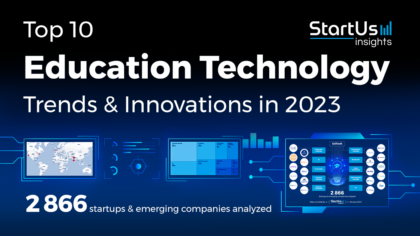

 WATCH THE VIDEO VERSION
WATCH THE VIDEO VERSION 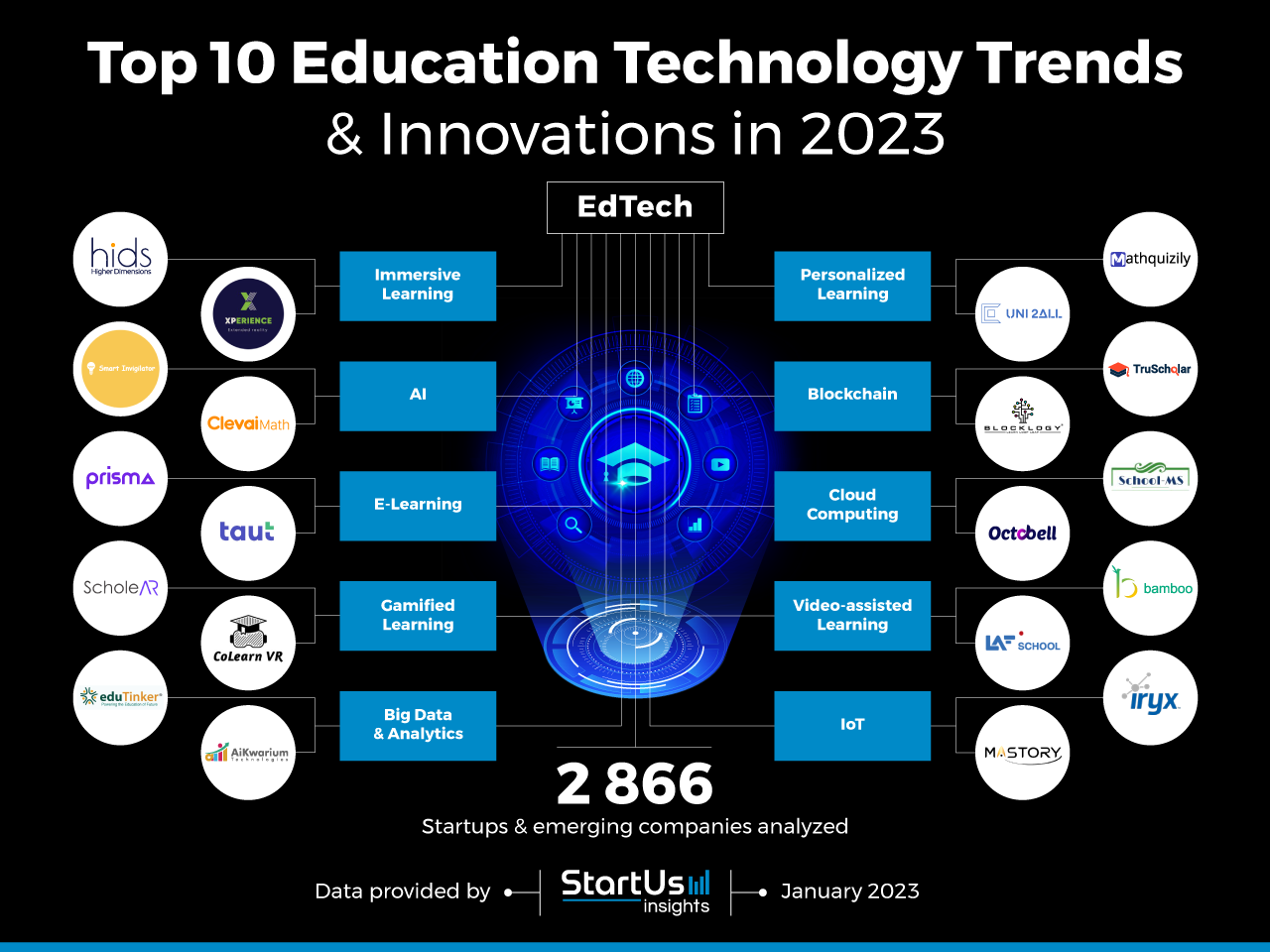
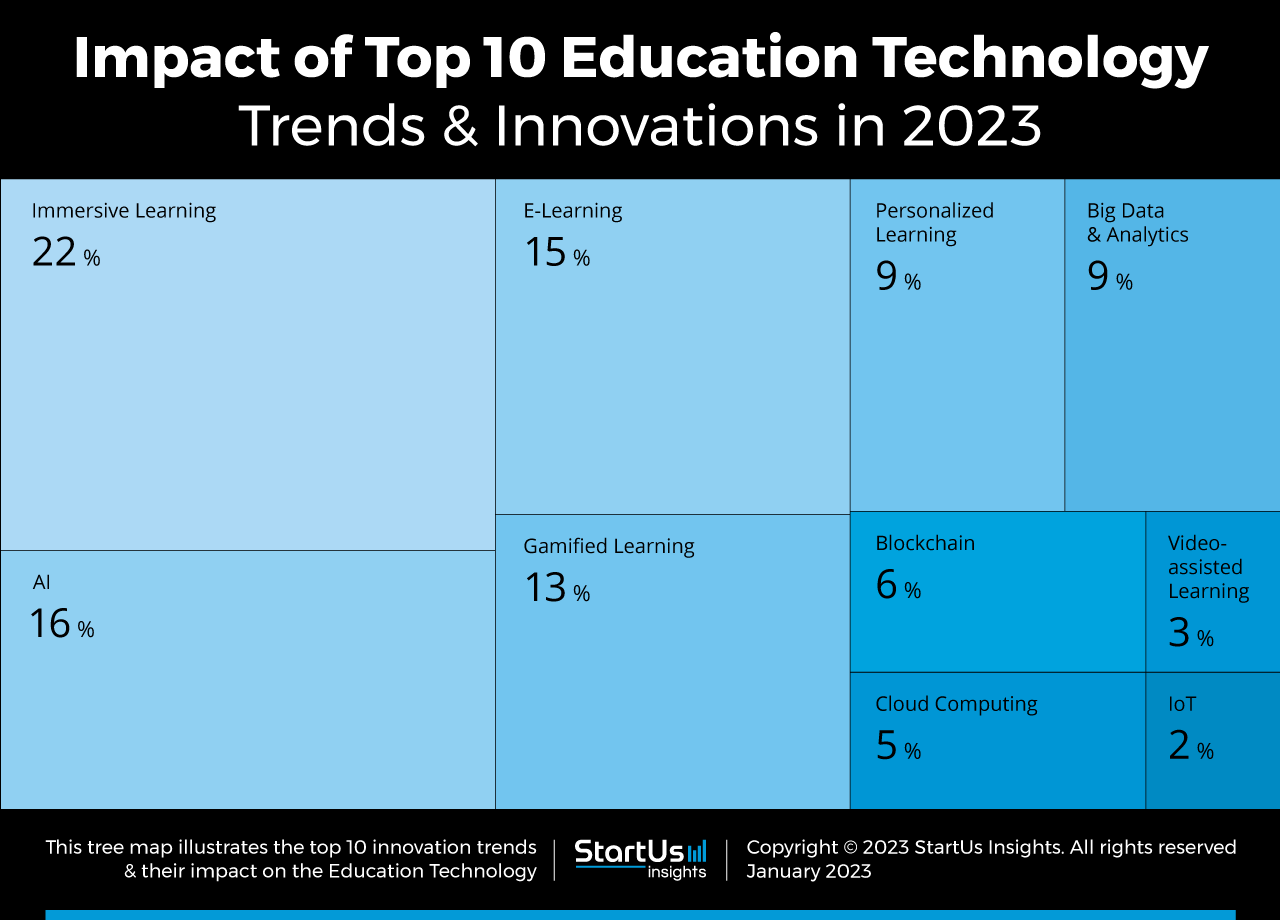
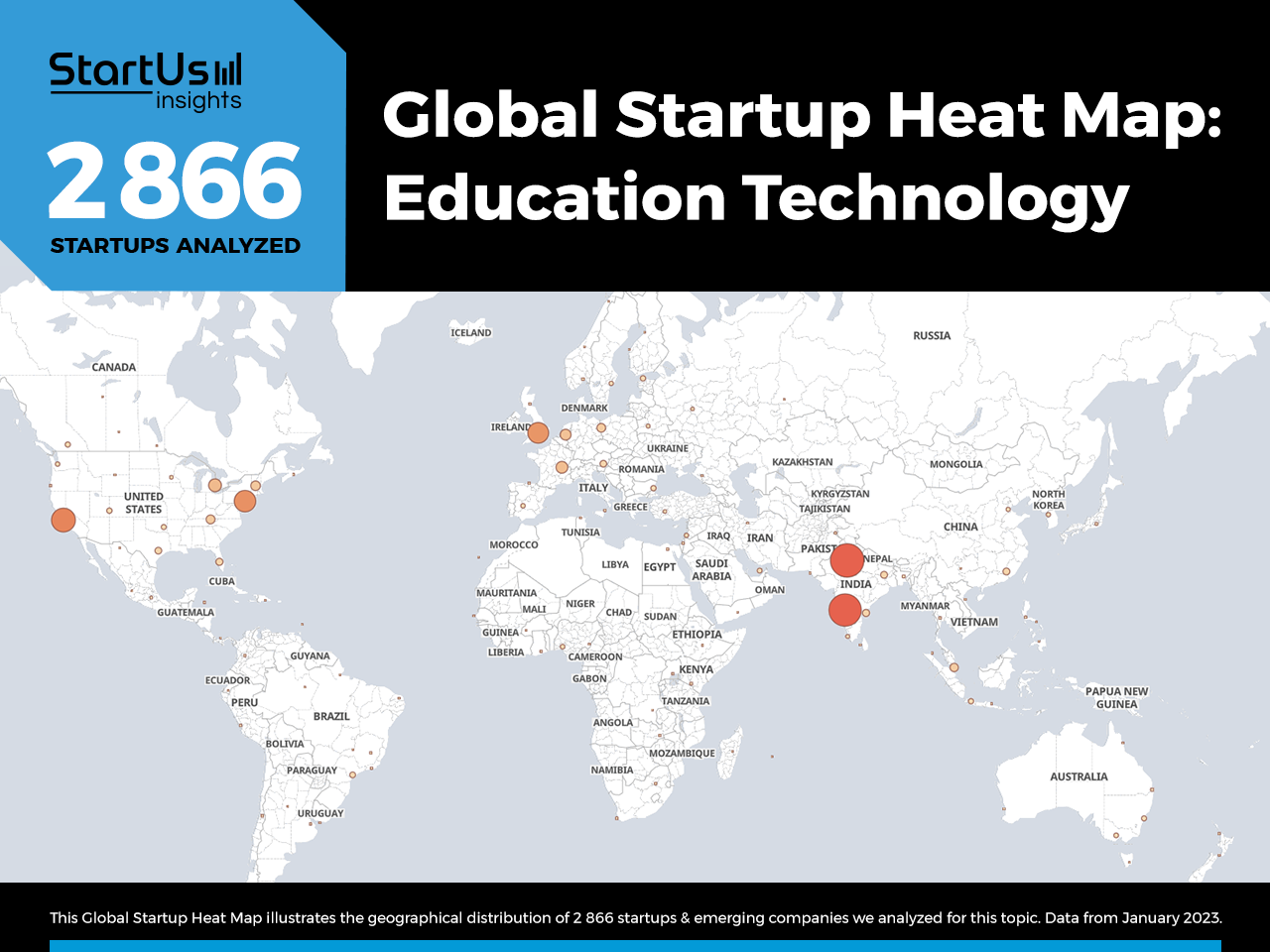
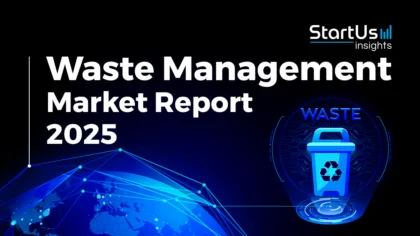
![Explore the 10 Emerging Smart City Trends [2025-2026]](https://www.startus-insights.com/wp-content/uploads/2025/06/Smart-City-Trends-SharedImg-StartUs-Insights-noresize-420x236.webp)




